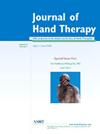The 2021 American Hand Therapy Foundation research priorities survey
IF 2.1
4区 医学
Q2 ORTHOPEDICS
引用次数: 0
Abstract
Background
In 1998, the American Hand Therapy Foundation (AHTF) surveyed Certified Hand Therapists and active Charter Members of the American Society of Hand Therapists to identify hand rehabilitation research priorities, guide grant awards, and confirm alignment with the foundation's mission.
Purpose
The American Hand Therapy Foundation repeated the survey in 2021 to confirm that its award funding was consistent with hand therapists' research priorities.
Study Design
Convergent parallel mixed method study design.
Methods
The survey was sent to 7093 hand therapists from the United States and overseas. Respondents’ demographic information was captured using quantitative questions analyzed with descriptive statistics and weighted means. Research priorities and interests were captured using qualitative questions, Grounded Theory analysis, and Constant Comparative Methods.
Results
A total of 397 surveys were returned and analyzed (5.6% return rate, 95% confidence level, 5% margin of error). Participants’ top research priorities were outcome studies and research grants. Tendon injuries and lateral epicondylitis were the highest prioritized diagnoses for further research. Intervention study priorities included hand rehabilitation management strategies and use of orthoses. Responses presented a need for funded outcomes research validating hand rehabilitation interventions. Level of interest in research participation was in data collection and as coauthor. Top barriers to participation in research activities were time constraints and lack of proficiency. Research education for clinicians and mentorship programs were identified as specific needs.
Conclusions
American Hand Therapy Foundation research award funding was consistent with practice and reported research concerns. Participants identified their top concerns for diagnostic and outcomes research and prioritized continuing Foundation involvement in funding clinical research.
2021年美国手部治疗基金会研究重点调查。
背景:1998年,美国手部治疗基金会(AHTF)调查了美国手部治疗师协会的认证手部治疗师和活跃的特许会员,以确定手部康复研究的重点,指导拨款奖励,并确认与基金会使命的一致性。目的:美国手部治疗基金会在2021年重复了这项调查,以确认其奖励资金与手部治疗师的研究重点是一致的。研究设计:收敛平行混合方法研究设计。方法:对7093名来自美国及海外的手部治疗师进行问卷调查。受访者的人口统计信息是通过描述性统计和加权方法分析的定量问题来获取的。研究重点和兴趣是通过定性问题、扎根理论分析和持续比较方法来捕获的。结果:共回收分析问卷397份,回收率5.6%,置信水平95%,误差幅度5%。参与者的首要研究重点是结果研究和研究资助。肌腱损伤和外侧上髁炎是进一步研究的最高优先诊断。干预研究的重点包括手部康复管理策略和矫形器的使用。回应表明需要资助的结果研究来验证手部康复干预措施。参与研究的兴趣水平是数据收集和作为共同作者。参与研究活动的最大障碍是时间限制和缺乏熟练程度。临床医生的研究教育和指导计划被确定为特殊需求。结论:美国手部治疗基金会的研究资助与实践和报告的研究关注是一致的。与会者确定了他们最关心的诊断和结果研究,并优先考虑基金会继续参与资助临床研究。
本文章由计算机程序翻译,如有差异,请以英文原文为准。
求助全文
约1分钟内获得全文
求助全文
来源期刊

Journal of Hand Therapy
医学-外科
CiteScore
3.50
自引率
10.00%
发文量
65
审稿时长
19.2 weeks
期刊介绍:
The Journal of Hand Therapy is designed for hand therapists, occupational and physical therapists, and other hand specialists involved in the rehabilitation of disabling hand problems. The Journal functions as a source of education and information by publishing scientific and clinical articles. Regular features include original reports, clinical reviews, case studies, editorials, and book reviews.
 求助内容:
求助内容: 应助结果提醒方式:
应助结果提醒方式:


